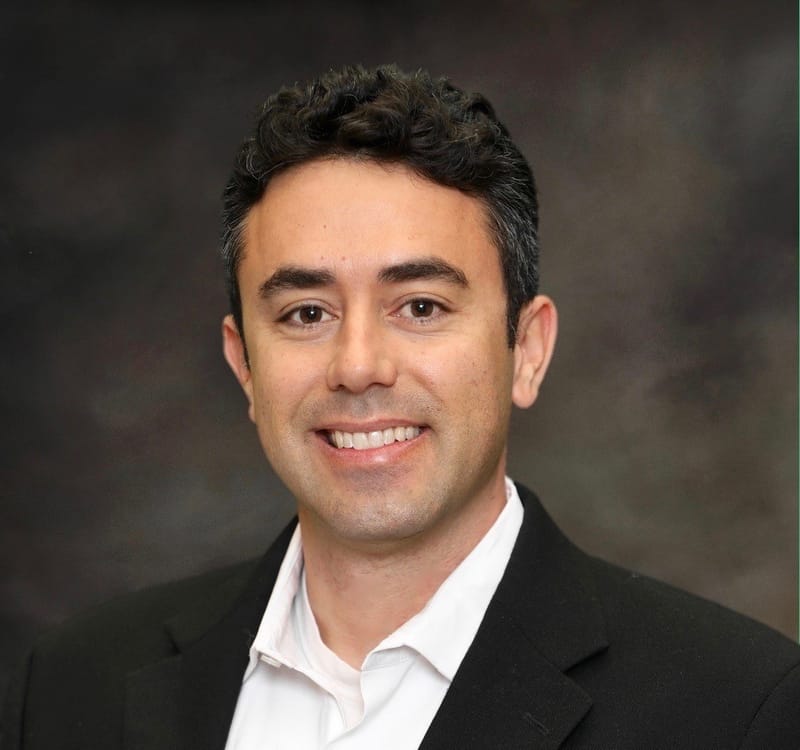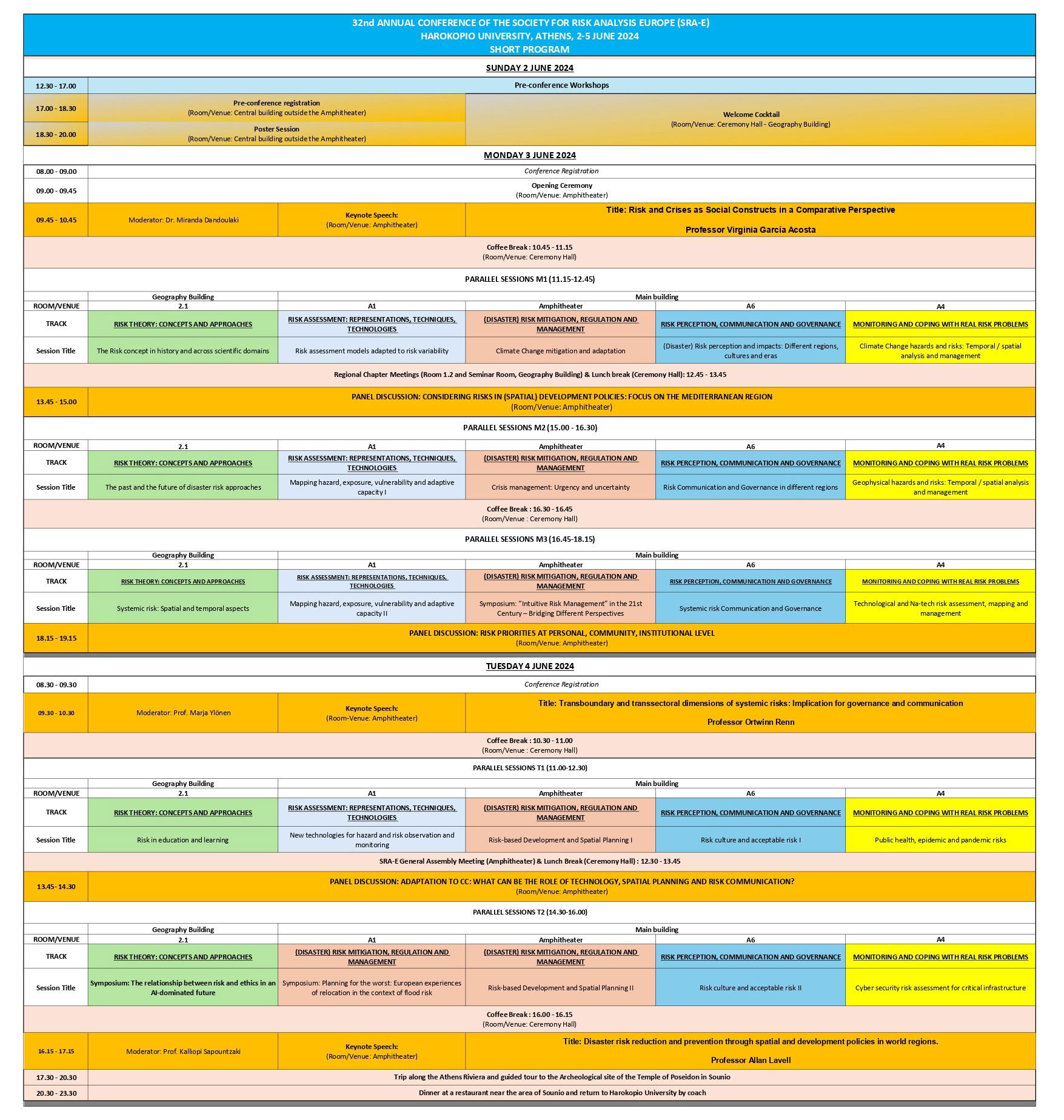ANNOUNCEMENT
UNDER THE AUSPICES

SRA-EUROPE

The Society for Risk Analysis - Europe (SRA Europe) aims to bring together individuals and organizations interested in risk analysis in its various facets such as risk assessment, risk management, risk governance and risk communication in Europe.
SRA-Europe (SRA Europe) is a regional, interdisciplinary organisation which addresses emerging issues in risk analysis, management and policy. The society emphasizes the European dimension in the promotion of interdisciplinary research and education, and in practical application in society, industry, businesses and the government. It provides a platform for academics and practitioners, policy makers, NGOs members, industry and business administrators and other stakeholders, to discuss future directions, to understand concerns about risk, to promote efficient risk mitigation and to develop effective communication about hazards.
The society encourages those interested in all aspects of risk analysis to communicate, collaborate and develop new methodologies for risk analysis and risk management.
SRA-Europe shares a common purpose with the International Society for Risk Analysis (SRA). SRA operates world-wide and has many regional organizations currently including Africa, Asia, Australia & New Zealand and U.S.A. regional organizations.
It provides a platform for academics and practitioners, policy makers, NGOs members, industry and business administrators and other stakeholders, to discuss future directions, to understand concerns about risk, to promote efficient risk mitigation and to develop effective communication about hazards.
SRA-E ATHENS 2024 CONFERENCE

Risk in Time and Space is the central theme of the SRA-Ε Athens 2024. Variability of risks in time and space is one of the most challenging elements. All types of risks (socio-natural, NATECH, technological or other man-induced) are space and time dependent regardless of their hazard origin.
Variability of risks in time and space is associated to variability of their components: hazard, exposure, vulnerability, sensitivity, resilience and adaptive/coping capacity. Hazard variability and unpredictability is mostly evident in the case of climatic and meteorological hazards showing not only unexpected changes over time but also variations between one place and another. Exposure is, indeed, increasing not only because of intensification and higher frequency of certain extreme events but expanding spatial development as well and constant mobility / flows of potentially exposed elements (people, goods and services, investment capital etc.). Regarding vulnerability and resilience/adaptive capacity these are probably the most volatile properties of the exposed entities. Indeed, complex processes of vulnerability transformation, transference and interaction amongst the several vulnerability facets (human, social, economic, institutional, physical) unfold in time and space.
Not only scientific and objective but perceived and subjective risks also are time and space dependent because communities change in the course of their development history and they are featured by different risk experiences, risk knowledge, risk culture, levels of acceptable and tolerable risk and risk governance patterns.
We welcome contributions related to risk assessment, risk characterization, risk perception, risk communication, risk management, risk governance, and policy relating to risk. All hazards and consequent risks for individuals, public and private sector organizations, and communities at local, national, regional, or global levels are of concern while the emphasis is on risk variations as well as risk management and risk governance transformations and differences in time and space.
KEY TOPICS
RISK ANALYSIS FUNDAMENTALS
- The Risk concept in history and across various scientific domains;
- Variability of risk determinants/components: exposure, hazard, vulnerability, adaptive capacity, resilience;
- Spatial and temporal aspects of systemic risk;
- The past and the future of risks, crises and disasters;
- Risk in education and learning in Europe and beyond;
- Risk in law across Europe;
RISK ASSESSMENT
- Spatial data-bases for risk assessment and mapping;
- Risk assessment methods capturing variability of risk;
- Areas/world regions, hot-spots for hazards, risks and disasters (geophysical, meteorological, hydrological, climatological);
- Vulnerability- and resilience-based social-spatial inequalities;
- New technologies for hazard and risk observation and monitoring;
(DISASTER) RISK MANAGEMENT
- Historical and contemporary (disaster) risk management paradigms;
- Spatial and temporal issues of the disaster risk management cycle;
- Urgency and uncertainty in crisis management;
- Management models adapting to variability of risk;
- Engineering and non-engineering safety regulations in different eras and contexts;
- Past and new technologies in risk and crisis management;
RISK PERCEPTION, COMMUNICATION AND GOVERNANCE
- Risk perception and communication in different regions, cultures and eras;
- Systemic risk communication and governance;
- Risk governance case studies for different regions;
(DISASTER) RISK MITIGATION IN SECTORAL POLICIES
- Policies for enhancing personal, community, institutional, urban resilience;
- Climate Change mitigation and adaptation policies;
- Risk-based Spatial Planning;
- Risks and Insurance across Europe;
MONITORING AND COPING WITH REAL RISK PROBLEMS
- Temporal / spatial analysis and management of geophysical hazards and risks;
- Temporal / spatial analysis and management of Climate Change hazards and risks;
- Technological and Na-tech risk assessment, mapping and management;
- History and geography of public health, epidemic and pandemic risks;
- Cyber security risk assessment for critical infrastructure in Europe;
- Food Security/Safety in Europe and beyond;
- Operational Aspects of Crisis Management;
RISK AND ETHICS
- Risk Culture and Acceptable Risk in Europe and beyond
- (Disaster) Risk management and cultural Inclusion
Proposals for additional risk topics for special sessions or symposia are also welcome;

ORGANIZING AND SCIENTIFIC COMITTEE
LOCAL ORGANIZING COMMITTEE AT HAROKOPIO UNIVERSITY
- Kalliopi Sapountzaki, Professor, Department of Geography, Chair of the Organizing Committee;
- Miranda Dandoulaki, Dr., Risk and Disaster Management specialist, Co-Chair of the Organizing Committee;
- Efthymios Karymbalis, Professor, Department of Geography
- Ioannis Daskalakis, PhD student, Department of Geography, Students’ Chair;
- Dafni Ioannidi, PhD student, Department of Geography
- Konstantinos Kavouras, PhD student, Department of Geography
- Nancy Andriakopoulou, student, Department of Geography
- Polykarpos Papadopoulos, Secretary of the Post-graduate Program “Applied Geography and Spatial Planning”
- Loreta Mitsi, administration staff
- Christina Gallousi, administration staff
SCIENTIFIC COMMITTEE
From the Board of SRA-E (current and former members
- Marja Katariina Ylönen, Associate Professor, University of Stavanger, Norway
- Rui Gaspar, Associate Professor, Lusófona University, Portugal
- Ferdiana Hoti, Dr., Umicore, Belgium
- Kalliopi Sapountzaki, Professor, Harokopio University of Athens, Greece
- Jamie Wardman, Associate Professor, University of Leicester, UK
- Angela Bearth, Dr., ETH Zurich, Switzerland
- Tom Jansen, Dr., National Institute for Public Health and the Environment (RIVM), Netherlands
- Mirjana Laban, Professor, University of Novi Sad, Serbia
- Ullrika Sahlin, Associate Professor, Lund University, Sweden
- Frederic Bouder, Professor, University of Stavanger, Norway
- Seda Kundak, Professor, Istanbul Technical University, Turkie
- Ragnar Löfstedt, Professor, Kings college, London, UK
- Terje Aven, Professor, University of Stavanger, Norway
From European and International Academic and Other Institutions
- Stefan Greiving, Professor, University of Dortmund, Germany
- Cassidy Johnson, Professor, University College London, UK
- Patrick Pigeon, Professor, Université Savoie Mont Blanc, France
- Tony Rey, Professor, Paul Valéry University, France
- Urbano Fra Paleo, Professor, University of Extremadura, Spain
- Roland Nussbaum, Executive Board Member, Association Française pour la Prévention des Catastrophes Naturelles et Technologiques (AFPCNT), Paris, France
- Scira Menoni, Professor, Politecnico di Milano, Italy
- Elizabeth Krausmann, Dr., Principal Scientist, Joint Research Centre (JRC), European Commission
- David Caballero, Dr., Head of Forest Fire Department, MeteoGrid, Spain
- Ana Maria Cruz, Professor, Disaster Prevention Research Institute (DPRI), Kyoto University, President of the Society for Integrated Disaster Risk Management (IDRiM), Japan
From Academic and other Institutions in Greece
- George Boskou, Associate Professor, Harokopio University of Athens
- Miranda Dandoulaki, Dr., Disaster Management Specialist
- Pavlos Delladetsimas, Professor Emeritus, Harokopio University of Athens
- Michalis Diakakis, Assistant Professor, National and Kapodistrian University of Athens
- Evangelia Drakou, Assistant Professor, Harokopio University of Athens
- Nikos Kalligeris, Dr., Principal Researcher, Institute of Geo-dynamics, National Observatory of Athens
- Efthymios Karymbalis, Professor, Harokopio University of Athens
- Petros Katsafados, Professor, Harokopio University of Athens
- George Kritikos, Professor, Harokopio University of Athens, Greece
- Yorgos Melissourgos, Dr., WWF Greece
- Sevastianos Mirasgentis, Dr., Research Director, Institute for Environmental Research and Sustainable Development, National Observatory of Athens
- Zoe Nivolianitou, Dr., National Centre for Scientific Research (NCSR) “DEMOKRITOS”
- Angeliki Paidakaki, Assistant Professor, Harokopio University of Athens
- Dimosthenis Panagiotakos, Professor, Harokopio University of Athens
- Panagiotis Rizomiliotis, Associate Professor, Harokopio University of Athens
- Elisavet Thoidou, Professor, Aristotle University of Thessaloniki
- Louis Wassenhoven, Professor Emeritus, National Technical University of Athens
- Gavriil Xanthopoulos, Dr., Senior Researcher, Hellenic Agricultural Organization "DEMETER", Institute of Mediterranean Forest Ecosystems
- Paraskevi Georgiadou, Dr., Hellenic Institute For Occupational Health And Safety
KEYNOTE SPEAKERS

Professor Virginia García Acosta
Keynote speech title: Risk and Crises as Social Constructs in a Comparative Perspective
READ MORE
Professor Hamilton Bean
Keynote speech title: Mobile Public Alert and Warning in the Climate Change Era: Reconsidering a Risk Communication Consensus
READ MORE
Professor Allan Lavell
Keynote speech title: Disaster risk reduction and prevention through spatial and development policies in world regions.
READ MORE
Professor Ortwin Renn
Keynote speech title: Transboundary and transsectoral dimensions of systemic risks: Implication for governance and communication
READ MOREPANEL DISCUSSIONS
PROGRAM
The final program of the 32nd Annual SRA-E 2024 Conference has been published. Please see below a short version of the final program.


For a detailed version of the final program that includes the allocation of the oral and poster presentations and the symposia, please CLICK HERE AND DOWNLOAD.
PRE-CONFERENCE WORKSHOPS
Two pre-conference workshops will take place in Athens, Greece, on June 2nd, 2024 between 12:30 and 17 o'clock:
- Pre-conference workshop for early career professionals (ECP)
- Pre-conference workshop "Trade-offs in Chemical Risk Management: Industry, Toxicology and Social Science Perspectives"
You can register for participation here. Participation is open and free to everyone attending the 32nd Annual Conference in Athens, Greece. More information below or here.
ECP: Risk Science and Communication
As with the last three SRA-E conferences, there will be a pre-conference workshop organized by the student representatives of the SRA-E chapters, aimed at young researchers who are at the beginning of their careers. The goal of these workshops is to provide a platform for young researchers to interact with others, deepen and broaden their knowledge of risk research topics and general scientific practices, and lastly, inform new SRE-E conference attendees about our society and the regional chapters.
Trade-Offs in Chemical Risk Management
Chemical risk management requires making trade-offs and taking decisions under conditions of uncertainty. This frequently involves considering the perspectives, needs and requirements of regulation, industry and politics. Moreover, it needs to consider the perspectives of various other stakeholders, among them the media, interest groups and the general public. Using case studies (e.g., Poly- and perfluorinated alkyl substances PFAS, plastic material), the workshop will take an interdisciplinary look at chemical risk management. Ongoing efforts to overhaul the way chemical risks are assessed and managed will require inputs from different stakeholders. Thus, the workshop brings together stakeholder perspectives and utilises concepts, theories and frameworks from risk research to tackle future challenges in chemical risk management and communication. It will feature input presentations by an interdisciplinary panel of speakers and the opportunity to meet, discuss and reflect with other participants.
This workshop is jointly organised by the consulting company HF Partners and the Swiss Centre for Applied Human Toxicology (SCAHT).
CONFERENCE BOOK OF ABSTRACTS
We are delighted to inform you that the Conference Book of Abstracts has been published and is available for download HERE.
ABSTRACTS AND SUBMISSIONS
Please note the following important dates and deadlines for the SRA-E 2024 Athens Conference:
- The platform for the submission of abstracts is closed. The deadline was until 7th February 2024. Thank you for your contribution!
- Registration deadline: 15th May 2024
- The abstracts, panel discussions and key-note speeches will be included in the ELECTRONIC BOOK OF ABSTRACTS. Additionally, we invite contributing authors and keynotes to show their interest in submitting the respective full papers for publication in the Special Issue of an acknowledged international journal under the title “Risk in Time and Space, SRA Europe’s 32nd Conference, Athens, Greece”. Editors for the Special Issue will be members of the Scientific Committee.
We are looking forward to welcoming you to Athens!
INSTRUCTIONS FOR ORAL/ POSTER PRESENTATIONS AND SESSION CHAIRS
The Conference Program has been uploaded on the website, in the section “Program” of the Conference
Instructions for Oral Presentations We kindly ask you to follow the instructions below:
- The time available for each presentation is 15 minutes. Depending on time availability in the session the Chair will decide on and allocate 3-5 minutes for questions. You will get more information from your session Chair.
- All presentations must be structured in pdf format only.
- Make note of the allotted time for your presentation.
- Please send your presentation to the Conference email (srae2024athens@hua.gr) at least one day before your presentation is scheduled to take place. For instance, if you are presenting on Monday, you must send your presentation by late Saturday or early Sunday. Please indicate in your email the title of the parallel session that your presentation has been allocated to.
- The presentations for each session will be saved in Google Drive cloud online and will be downloaded on the local computer before the start of each parallel session. However, please carry a USB stick containing your presentation as a back-up in case of technical or other problems.
- Arrive at your session a few minutes in advance so there is time to set everything up together with the Chair.
- If you absolutely need to use your own computer, please contact the Chair to make specific arrangements and make sure to have all the required adaptors. However, for technical and security reasons, we discourage such practice.
Instructions for the Chairs of the parallel sessions
- The names of the Chairs of each session are shown in the detailed program of the Conference.
- The oral presentations for each session will have been downloaded on the local computer in the room where the session takes place.
- Participants have been asked to bring their presentation in USB sticks as well, in case they cannot find their presentation in the local computer.
- On the desk of each room the Chairs will find the contact details of the organization staff in case they need technical assistance.
- Each oral presentation lasts 15 minutes.
- The time allocated for questions is approximately 3 – 4 minutes per presentation. Questions may be asked either directly after each presentation or at the end of the session. This is up to the Chairs to decide.
Instructions for poster presenters
- The poster presentation session will take place on Sunday 2nd June at 18.30 – 20.00.
- Poster presenters are required to arrive a few hours earlier at the University Campus (by 16.00) to hang their posters in the designated positions.
- The Conference organizers will indicate the designated position for your poster, will provide the necessary pins and duct tape, and may also assist you to hang your poster in place.
- The maximum size of each poster is set at 1 meter by 1 meter.
- Poster presenters should have their posters printed out.
- Posters will remain hanging throughout the duration of the Conference.
- On the final day of the Conference, you may remove your poster after lunch break and take it with you in case you are leaving early, otherwise you may remove it at the end of the conference.
THE ORTWIN RENN PRIZE AND TWO HONORABLE MENTIONS
Step 1 – Shortlisting of abstracts - A short-list of 28 abstracts out of 201 in total has been compiled on the basis of the comments and proposals of the reviewers (all of them members of the Scientific Committee of the Conference).
Step 2 - Top 3 selection - The Awards Committee composed of five members (three members from the Board and two members from the Local Organizing Committee) will select the top 3 presentations (one winner + two runners-up) by attending in person the 33 oral presentations of the shortlist during the conference. The selection criteria are the following:
- Relevance with respect to the conference theme “Risk in Time and Space”
- Pan-European added value
- Clear aim and research questions / entirety of the work (i.e. a presentation making clear reference to objectives, methodology and results)
- Strong link to risk theory
- Clear reference to the connection / feedback between theory and practice
- Novelty / originality in terms of the objectives set and/or the methodology followed
- Overall presentation quality
SPECIAL ISSUE IN THE JOURNAL OF RISK RESEARCH
We invite contributing authors of oral and poster presentations and keynote-speakers to show their interest in submitting a paper for the Special Issue “Risk in Time and Space, SRA Europe’s 32nd Conference, Harokopio University of Athens, Greece” in the Journal of Risk Research. Editors for the Special Issue will be Kalliopi Sapountzaki (Prof. Harokopio University of Athens) and Miranda Dandoulaki (Dr., Risk and Disaster Management expert, Secretary to the BoD of IDRiM Society) supported by members of the Scientific Committee of the Conference depending on the thematic scope of submissions. The Special Issue may be structured into parts with specific thematic orientation (e.g. Part A-Disaster Risk, Part B-Everyday Risk), according to the thematic specialization of the submissions.
You may send your full text paper to srae2024athens@hua.gr. Due to the large number of requests, the submission deadline has been extended until Saturday 30th November 2024.
Short-listed papers will be invited to submit to JRR. Requirements/prescriptions to submit a paper to the Special Issue are: (a) at least one of the authors of the full paper has contributed to the conference, (b) the subject/title of the full paper submitted identifies with the respective presentation in the Conference and (c) the paper follows the guidelines for authors set by the JRR.
Please note that Taylor & Francis is committed to peer-review integrity and upholding the highest standards of review. Once your paper has been pre-selected and assessed for suitability by the editors, it will then be double blind peer reviewed by independent, anonymous expert referees
Preparing Your Paper for the Special Issue in the Journal of Risk Research
Full papers should follow “Instructions for authors” of the Journal. For your convenience, these are summarised in the following.
Structure
Your paper should be compiled in the following order: title page; abstract; keywords; main text introduction, materials and methods, results, discussion; acknowledgments; declaration of interest statement; references; appendices (as appropriate); table(s) with caption(s) (on individual pages); figures; figure captions (as a list).
Word Limits
A typical paper should be no more than 8000 words, inclusive of:
● References
● Endnotes
Style Guidelines
Please refer to these quick style guidelines when preparing your paper. Any spelling style is acceptable so long as it is consistent within the manuscript. Please use single quotation marks, except where ‘a quotation is “within” a quotation’. Please note that long quotations should be indented without quotation marks.
Formatting and Templates
Papers may be submitted in Word. Figures should be saved separately from the text. To assist you in preparing your paper, we provide formatting template(s). Please find the list of Word templates HERE and save the template that suits you, to your hard drive. Please build your paper according to the specified template.
References
Please use the “Chicago author-date” reference style when preparing your paper. You may find more information regarding the indicated/preferred reference style HERE. An EndNote output style is also available to assist you.
FEES AND REGISTRATION
Registrations for the SRA-E 2024 Conference are now open. You may register until the 15th May 2024.Please note that all the participants need to register for the conference (i.e. keynote speakers, panelists, contributors, attendees). You may visit the registration platform by clicking here.
32nd SRA-E Conference FEES | |
| Late Bird | |
| Deadline 15 May 2024 | |
| SRA-E member | 450 € |
| non SRA-E member | 550 € |
| Student SRA-E member | 250 € |
| Student non SRA-E member | 300 € |
| Participants from non-high income countries according to the World Bank classification (for eligibility see here) | 325 € |
| Students from non-high income countries according to the World Bank classification (for eligibility see here) | 180 € |
| SRA-E members from Greece | 325 € |
| non SRA-E members from Greece | 450 € |
| Student SRA-E members from Greece | 180 € |
| Student non SRA-E members from Greece | 250 € |
IMPORTANT NOTES
- The Conference Fees include the cost of lunch and coffee breaks for three days, the welcome cocktail, the conference organization and conference material.
- The field trip and the conference dinner at a location nearby Athens are optional and the cost to participate in this event will be announced shortly.
- Keynote speakers are exempted from registration fees.
- Panelists are eligible to register by paying the students' fee accordingly.
- All annual conference registration fees for non-members include a complimentary offer for SRA-E membership valid for the year 2024-2025 (up to the next SRA-E Conference).
VENUE
HAROKOPIO UNIVERSITY OF ATHENS (HUA)

The SRA-Ε-Athens 2024 Conference is held at Harokopio University of Athens (HUA). HUA is a public university that promotes research and education in a well-focused set of scientific areas: geography; economics and sustainable development; nutrition and dietetics; informatics and telematics. It originates from an educational institution for women that was first established in 1929. Today, HUA comprises three Schools with five undergraduate departments and ten post-graduate programs.
The University’s campus is situated close to the centre of Athens and to many important cultural sites of interest such as Acropolis, the Acropolis Museum, Thissio, Panathenaic Stadium (Kallimarmaron), Keramikos and the Benaki Museum.

DEPARTMENT OF GEOGRAPHY

The Conference is organized by the Geography Department that focuses among others on physical, social and policy dimensions of hazards, risks and disasters. The organization is also supported by the Department of Nutrition and Dietetics covering issues of food safety and security, and by the Department of Informatics and Telematics.
The Department of Geography, was founded in 1999 and is one of the two Greek university departments dedicated to Geography, a dynamic scientific field at the intersection of physical and social sciences. It holds the Post-Graduate Programme Applied Geography and Spatial Planning running three specialized Courses: “Management of Natural and Human Induced Risks and Disasters”, “Spatial Policies and Development in Europe”, and “Geo-informatics”.
CONFERENCE ROOMS
Please find below the layout of the conference rooms in Harokopio University Campus.

Campus

Main Building

New building
TRAVEL AND ACCOMMODATION
Athens Airport connection with the City Centre and Harokopio University.
- By Taxi, a journey of 30-40 min, (approximately 50 euro)
- By Metro. Line 3 (blue line) connects the airport to the city center. The journey time is approximately 40 minutes. Trains run every 30 minutes, 7 days a week from 6:30 am to 11:30 pm.
- By Bus. 24-hour express bus X-95 connects the airport to the city center and Syntagma square. The journey time is approximately 60 minutes

1. Athens Metro Map

2. Access to Harokopio University from Metro Station Tavros (Green line)

3. Access to Harokopio University from Syggrou – Fix Station (Red line).
You can use taxi, or the trolleybus number 5, or the bus 040 (disembark at Harokopio stop).
For your accommodation, you can see the proposed list which is not restrictive and availability is not guaranteed. In general, early June when the conference takes place, is a high demand period. Therefore, we urge you to make arrangements for your accommodation as early as possible (PREFERABLY BY EARLY MARCH)
Athens is a touristic city, therefore there is a variety of accommodation options.
For your convenience, we provide a list of hotels located near the University campus.
Proposed accommodation options:
CULTURAL TOUR AND CONFERENCE DINNER
For the participants that have opted for the cultural trip and the dinner:
17.15 - Departure from Harokopio University by coach. Trip along the Athens coast. In each coach there will be one tour guide present.
18.45 - Arrival at Sounio and guided tour at the Temple of Poseidon
20.15 - Departure from the temple of Poseidon to “Agnanti” restaurant where we will be having dinner
20.30 - Arrival at the restaurant
23.30 - Departure from the restaurant and return to Harokopio University
For the participants that have opted only for the dinner:
18.30 - Departure from Harokopio University by coach
20.30 - Arrival at the restaurant where we will be having dinner (joining the group that opted for the cultural tour)
23.30 - Departure from the restaurant and return to Harokopio University.
Please note that it is not possible to attend only the cultural tour and not the dinner, as the restaurant we will be dining in is near the temple of Poseidon, which is located approximately 70km from Athens.
For the cultural trip and the dinner we suggest that the attendants are casually dressed.
The temple of Poseidon in Sounio

The Conference dinner will be held at “Agnanti” Restaurant

EXPLORE ATHENS
CONTACT
- Leof. El. Venizelou 70, Kallithea 176 76
- Harokopio University

